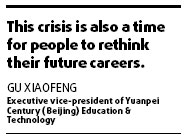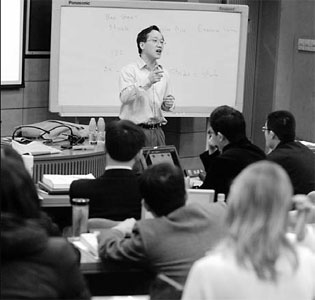A matter of course
|
Financial crisis looms, education market booms. Young people invest in further education to prepare for their future careers. File photos |
It seems to be a golden rule during the economic downturn not to quit a job unless there is a better offer. Yet the rule doesn't apply to risk-takers, such as Sun Xiaonan. When he resigned weeks ago, Sun, 27, in Guangzhou, capital of Guangdong province, had five years' sales and marketing experience in two foreign "Fortune 500" IT companies.
"The global crisis has indeed imposed great pressure on industries in South China. Companies are cutting down budgets and projects worth of tens of millions of yuan have been canceled. This may relate to the economic models here in the Pearl River Delta, which are underpinned by processing and export industries," he says.
Sun decided to re-skill and has enrolled in a one-year full-time MBA program at the Cheung Kong Graduate School of Business starting in November.
He's excited about returning to school and hopes to land an internship related to finance and trade beforehand in order to widen his practical experience ahead of studying theory.
The education industry might be one of the few beneficiaries of the downturn. Many private schools and institutes have reportedly witnessed an increase in the number of white-collar workers driven by an urgent need to diversify their skills.
The companies Sun worked at often arranged weekend training and encouraged staff to take part-time courses at a nearby university. "But under those conditions, people still have their work to worry about. Going full-time will enable me to commit wholeheartedly," he says.
Sun also expects his degree to open up more career opportunities. He had been in the IT industry since graduating from university but has confidence in China's fledgling business community and wants to work there. Hopefully, he will one day start his own company.
"I'm good at marketing but weak in management and finance. Taking the MBA course will extend my knowledge and help me prepare for better job offers," he says.
"This crisis is also a time for people to rethink their future careers," says Gu Xiaofeng, executive vice-president of Yuanpei Century (Beijing) Education & Technology, a translation and interpretation company.
Gu says people are now cautious about their spending, particularly on cars and housing. They are more open to investing in further education, especially if they think it will make them more competitive when the recession is over.
"In previous years people called for advice about courses about a week after the Spring Festival," she says. "This year, they were registering as soon as the festival break was over, two weeks earlier than usual."
She adds that the share of working people, as against university students and graduates, rose from 40 to 60 percent.
|
Cheung Kong Graduate School of Business has witnessed an increase in the number of white-collar workers. |
A famous recruitment website, www.chinahr.com, conducted a recent survey showing that people were more interested in learning English when they wanted to up-skill. Many leading English language institutions have experienced 20 percent more new applicants.
According to Zhang Zhenning, a human resource counselor for the site, most students are from the very industries suffering most from the financial crisis, like the import and export trades, IT outsourcing and luxury businesses.
Xiao Yan, PR director of Walk Street English (China), has noted a slight decrease in orders for corporate training as companies cut costs. People's individual needs are on the rise, however, especially those who have been laid off from work. They might have been too busy to study in the past but now they have plenty of time to multi-skill, she says.
Gu says people are not only under pressure to keep their jobs - job seekers also face greater competition from overseas Chinese returning home.
"We met many such talented people at a recent job fair," she says. "They have worked for years on Wall Street, speak fluent English and know how to communicate with foreign companies. Nor do they demand high salaries. All these are quite attractive qualities for Chinese employers."

Sun Xiaonan will find a cosmopolitan classroom waiting for him in November. Angela Qian, assistant director of marketing and admissions at Cheung Kong, says the school has seen a surge in international students this year, many of them graduates from elite American universities, including Harvard, Stanford and the Massachusetts Institute of Technology.
Gaining extra skills is useless, however, if it does not lead to better job opportunities.
Michelle Lin worked for 12 years for foreign companies in Beijing and spent plenty of time trying to improve her English but none of the extra courses did anything for her. She has now studied at Yuanpei for more than a month and says its translation course is just what she needed.
"I used to be content with a superficial understanding of words and phrases but now I'm paying more attention to the differences between similar words and learning to use them accurately."
The course paid off straight away when Lin landed a job as an interpreter on a Sino-US real estate forum. "I don't plan to be a professional translator or interpreter but at least I have one more choice if I'm ever unemployed," she says.
Once you decide to learn something, she suggests, do not rush off and enroll at the first training institution you find. Nor should you be easily persuaded by sidewalk ads promoting institutions that might not even be qualified.
"First understand your real interests and the purpose you are studying," she advises. "Also, it is very important to talk with study counselors at these institutions."
Some training institutes provide online courses and downloadable material. However, Xiao Yan says the best language education is face-to-face and online studying should only be seen as a useful supplement.
Qian believes the economic climate should not be your only reason to enroll. "If you want to study at our school just because you can't find a job, it may suggest you are unqualified and not well-grounded," she says.
She says Cheung Kong most welcomes those who have worked for some years and has a clear picture of his/her dreams, abilities - and failings - and how he/she can gain from studying.
Although Sun Xiaonan's course is several months off, he has already befriended many of his future classmates. "We get together from time to time," he says. "We have different backgrounds in finance, sales, human resources and media. We're learning a lot from each other."
He is certainly the kind of student Qian welcomes. "Education is for life," he says, "not only a refuge in a time of crisis".
(China Daily 04/13/2009 page8)
















